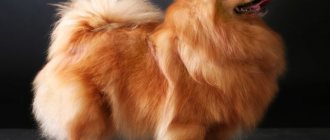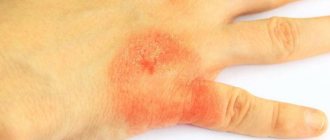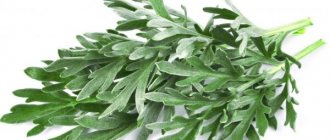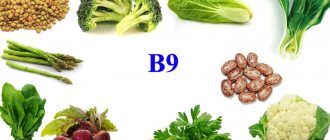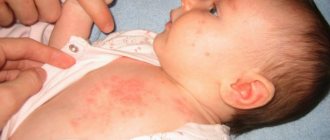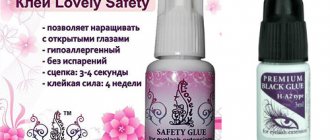Can you have an allergic reaction to sunflower seeds?
In general, allergies are a rather individual disease. It is simply impossible to predict which product will provoke manifestations of intolerance.
When asked whether there is an allergy to seeds, all doctors answer unequivocally - yes, it happens. And if you are intolerant, such a product can cause a fairly serious deterioration in your well-being.
Causes that can cause illness
Various components of sunflower seeds, in particular albumin and globulin, can provoke the development of allergic reactions. Many doctors consider them to be very strong irritants, so if there is a certain predisposition, their entry into the body will activate an abnormal response of the immune system. The allergen triggers the synthesis of histamines in order to cleanse the body of potentially dangerous components, which is manifested by typical signs of allergies.
Also, allergic reactions to seeds can occur due to:
- The presence of traces of fertilizers or heavy metals in the seeds that entered the plant during cultivation.
- Reactions to chemical components used in the seed treatment plant. In this case, the allergy will manifest itself only to factory products, and the actual collected (grown or processed) seeds will not provoke any negative symptoms.
In severe cases of allergies, the body can react not only to the seeds themselves, but also to sunflower oil. But this situation occurs very, very rarely.
If we talk about the causes of allergies in general, doctors cannot yet determine exactly what mechanism triggers such an abnormal reaction of the body to completely natural foods and substances. There are theories that a tendency to allergic reactions may be caused by:
- Hereditary predisposition.
- Excessive hygiene, in other words - insufficient loading of the immune system.
- Growing consumption of all kinds of chemicals.
- The presence of concomitant diseases, including diseases of the digestive tract.
To date, scientists have not identified a relationship between the presence of allergies and general health. But doctors have come to the unequivocal conclusion that parents with allergies have a greater risk of giving birth to a baby with the same pathology than healthy couples.
Seeds for breastfeeding: when, what and how much
Not all mothers know whether seeds can be consumed while breastfeeding, whether they are harmful or beneficial, and whether seeds are safe for the baby.
Are they useful or harmful?
Many people associate seeds with unhealthy foods. There is even a concept of dependence on seeds. Many people are familiar with the situation when you are going to eat several pieces, but in the end you cannot stop, the process drags on more and more.
In fact, raw seeds have a valuable composition. Among their components are:
- Protein. This is a “building” material for the body; it takes a key part in metabolism;
- Microelements: zinc, iron, calcium. They participate in biochemical processes, positively affecting the composition of bones, skin and hair, and the immune system;
- Vitamins A, B, C, D, and E. They normalize cardiovascular function;
- Fatty acid. Reduces cholesterol levels.
The product promotes good functioning of the intestines, gallbladder and liver, improves appetite and helps fight postpartum depression.
The benefits of raw seeds are obvious. But during heat treatment they lose most of the nutrients.
Is it possible for a nursing mother to take the seeds?
Sunflower seeds are not included in the list of prohibited foods for breastfeeding women. You can eat them. Although there are contraindications:
- Individual intolerance in the form of an allergic reaction;
- Constipation - both in mother and newborn;
- Colic and bloating in a child;
- Destruction of tooth enamel.
It follows that you can eat seeds when feeding, but carefully and in reasonable quantities.
Sunflower
This is the most common type of seeds. Many women will agree that during postpartum depression there is often a desire to chew on seeds. This process calms the stressed and tired mother from sleepless nights.
Sunflower seeds boast a high protein content. 40% of the daily value is contained in just 100 grams of the product. For a nursing mother, this is a great way to receive this valuable component for the body. Sunflower seeds lift your spirits and have a beneficial effect on the gastrointestinal tract, liver, kidneys and cardiovascular system.
You can eat fried ones while breastfeeding, but raw ones are healthier. They contain the highest concentration of valuable substances.
Pumpkin
Pumpkin seeds are perhaps the best option for breastfeeding, since this type is considered the most hypoallergenic. They contain a lot of zinc, which has a beneficial effect on the condition of hair and skin. But the proportion of protein in them is much less. 100 grams of product contains 14 grams.
Nursing mothers can take pumpkin seeds as an antiparasitic agent. Unlike pharmaceutical drugs with similar effects, they have no side effects. But the effectiveness of such herbal medicine is usually lower.
During breastfeeding, pumpkin seeds can be consumed in fairly large quantities; they are lower in calories compared to sunflower seeds, which means they do not spoil the figure.
Sesame
During breastfeeding, sesame seeds are not only acceptable, but recommended. In addition to their beneficial effects on the immune system, they also cleanse blood vessels and lower cholesterol levels. They contain a lot of calcium, which is involved in the process of formation and strengthening of teeth, hair and nails.
Nursing mothers should consume sesame seeds one teaspoon daily.
Linen
Flaxseeds are a storehouse of useful natural elements, such as fatty acids and B vitamins. Their use after childbirth helps restore the hormonal levels of the mother and the production of breast milk.
Flaxseeds also have a beneficial effect on the baby during breastfeeding. Entering it through milk, they saturate the body with vitamins.
These seeds have contraindications and side effects. For example, they prevent iodine from being absorbed normally. Not recommended for inflammatory bowel diseases and kidney problems (promote the formation of stones). In small quantities they will not harm. But you shouldn't get carried away.
Sweets made from seeds
Thanks to the natural composition, kozinaki made from seeds is a good replacement for pies and sweets.
Kozinaki is allowed for a nursing mother in small quantities. The molasses in the composition can cause an allergic reaction in a child. Kozinaki is very fatty and high in calories, they are not suitable for overweight girls.
How, when and how much
In the first month after birth, seeds are not prohibited during breastfeeding. But in order not to harm the baby and yourself, follow the rules:
- Do not buy seeds in their purified form - they are full of microbes;
- Be sure to wash before eating or frying;
- Do not eat seeds at the same time as other foods. It's best to snap them between meals;
- Don't overuse it. Maximum – 50-80 grams per day. This amount can be eaten already in the second month after birth. You should start with 20 grams, gradually increasing the volume.
- To have a beneficial effect, eat only fresh grains. Fried - only occasionally.
If you introduce seeds into the diet, carefully monitor the child’s condition. If your baby has:
- Colic increased;
- The character of the stool has changed dramatically;
- A rash appeared
Avoid this product for a while.
Can you be allergic to seeds?
Yes maybe. The most allergenic seeds are sunflower seeds.
An allergic reaction in a baby is usually expressed in skin rashes. So start eating just a little bit at a time. If no changes occur, then you can increase the volume.
If a reaction does occur, you should immediately stop consuming the seeds, even if there are very few rashes. Each type of this product has an individual composition. This means that if you are allergic to one type, you may not have a reaction to others.
So, seeds have much more beneficial properties than negative ones. Breastfeeding women should still pay attention to this natural product if there are no contraindications.
Source: https://ProGrudnoe.ru/pitanie/semechki-pri-grudnom-vskarmlivanii.html
Possible symptoms
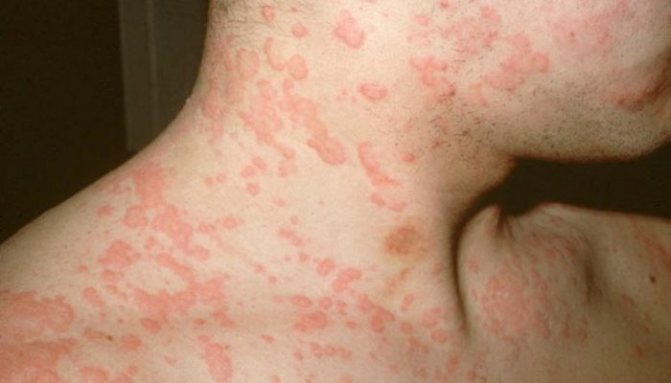
As a rule, an allergic reaction to various foods, including sunflower seeds, occurs quite quickly - in a matter of hours, and sometimes even minutes. It is believed that such intolerance can make itself felt:
- Formation of small itchy rash elements on the skin. They can swell, becoming like blisters, like after a nettle burn.
- Watery eyes, the appearance of clear discharge from the nose, coughing, or difficulty breathing properly due to a spastic reaction in the bronchi.
- Swelling of the mucous membranes of the oral cavity and pharynx. This is how dangerous Quincke's edema can manifest itself.
- Difficulty swallowing.
Sometimes seed intolerance manifests itself as disruptions in the digestive tract. In such a situation, you can suspect an allergy by:
- Nausea and heaviness in the stomach.
- Increased gas formation.
- Various stool disorders, loose stools are more common.
If there is a certain predisposition, the seeds can become provocateurs of allergic dermatitis, causing rashes and areas of redness in different parts of the body.
It is worth noting that an allergy to sunflower seeds manifests itself not only when eating the seeds themselves, but also other products in which they are present, in particular, halva, kozinaki, etc.
Seeds during breastfeeding can cause allergies in a child
The issue of nutrition for a nursing mother has always caused some controversy. Some foods were considered healthy for babies, others not so much. And at the same time, each mother had her own grocery list. How to figure out what is good for your baby during breastfeeding.
Can a mother eat seeds during lactation?
Breastfeeding mothers sometimes want to crack sunflower seeds, but the question arises: is it possible to eat sunflower seeds while breastfeeding? Some women during lactation cannot deny themselves such pleasure. According to them, no undesirable manifestations were observed on the part of the baby.
In fact, seeds and different types of nuts can be harmful to a child, because these products are recognized as allergens. It is better to limit the consumption of such products during breastfeeding, or completely abandon them.
If you wish to introduce seeds into your diet, do so as usual. When using little by little, keep an eye on your baby.
If he does not have any suspicious reactions in the form of skin rashes or bloating, then you can safely enjoy your favorite product, but, of course, in moderation.
If your child develops rashes or flatulence, it is too early to introduce seeds into the diet, and you will have to be patient.
Our women consume seeds, knowing about their ability to increase lactation. But it must be borne in mind that excessive lactation is not advisable. If you really want seeds, then it is better to take roasted pumpkin seeds, they are not as allergenic as sunflower seeds. And remember that in every measure there is benefit, but in abuse there is great harm.
How to avoid and cure cracked nipples?
In the first months of breastfeeding, mothers often encounter problems when abrasions appear on the surface of the areola and subsequently turn into painful cracks.
There may be several reasons why cracks form in the nipples: dry and sensitive skin in the area of the nipple areola, hypovitaminosis or improper breast care. Knowing the reasons, a nursing woman can avoid the appearance of cracks in her breasts.
Measures to prevent nipple cracking include:
- Proper breast care. It is not advisable to frequently wash your breasts with soap and treat your skin with alcohol solutions. It is enough to take a shower every day and rinse your chest with warm water.
- Eliminate contact with nipple moisture. If milk leaks frequently, a nursing mother needs to insert special pads into the bra that will absorb the released milk, thereby limiting the contact of the nipples with moisture.
- Correct attachment to the baby's breast. The baby must grasp the breast correctly so that the skin of the nipple will not be injured.
- Taking special vitamins. Multivitamins for nursing help prevent the development of hypovitaminosis. They provide the skin with elasticity and the ability to heal quickly.
If cracks in your nipples do appear, take immediate action. After feeding, the damaged area around the nipple should be lubricated with lanolin ointment, for example, Purelan.
Sea buckthorn oil, fresh aloe and Kalanchoe juice heal cracks well. Lubricate a sterile cotton pad and apply it to the nipples between feeding sessions.
If there are deep cracks in the nipples, you should stop breastfeeding. Gently express the milk and give it to your baby from a spoon. After the wounds have healed, you can resume your usual feeding routine.
Do not start the process of treating cracked nipples: if you do not take the necessary measures in time, an inflammatory process or mastitis may develop in the mammary gland.
The affected areas on the nipple are an excellent place for infection to enter. Considering that during the postpartum period a woman experiences immune weakness, it will be difficult to resist infection.
First aid kit for a newborn baby and nursing mother
The baby's and mother's first aid kit must contain items that can provide first aid for various ailments: diarrhea, colds, high fever, poisoning, etc.
A children's first aid kit should contain the following components:
- drugs that improve the release of gases (Espumizan, Plantex)
- laxatives (Duphalac)
- medicines for colds, coughs, runny nose (Nazivin, Prospan)
- antipyretics (Panadol, Efferalgan)
- hydrogen peroxide, brilliant green
- enema
- thermometer
- cotton wool, bandages
A nursing mother's first aid kit may have significantly more components. Since women often have delicate problems, the contents of the first aid kit should contain a number of medications.
Among them:
- laxatives (Duphalac, Microlax)
- antipyretics (Nurofen, Paracetamol)
- cough medicines (Prospan, Mucaltin))
- antiviral agents (Grippferon, IRS19)
- anti-inflammatory drugs (Epigem)
- antimicrobial agents (Miramistin, Panavir, Pimafucin)
- preparations for wound healing (Purelan ointment)
All necessary supplies for the baby and nursing mother are collected (necessarily separately). You should keep first aid kits away from children and do not forget to check the expiration dates of medications.
Source: https://OtvetyMamam.ru/post/semechki-pri-kormlenii-grudyu-mogut-sprovotsirovat-poyavlenie-allergii-u-rebenka-595.html
Diagnostics
Only a qualified doctor can determine whether existing health problems are signs of allergies. Modern research methods also help to find out what exactly the allergen is. To make a correct diagnosis, the doctor may prescribe:
- Routine clinical blood test.
- Carrying out skin tests - scratches using provocateurs.
- Testing for specific Ig E bodies.
- Conducting provocative tests.
- Following a diet to eliminate the suspected allergen (or allergens).
Trying to independently determine the allergen using the selection method can pose a serious threat to health. Therefore, if alarming symptoms appear, it is better to seek qualified medical help.
Treatment methods

It is impossible to completely cure allergies. When you use the seeds again, it will manifest itself again and, most likely, much more clearly than in previous times. Therefore, if such a problem exists, the patient will have to completely stop eating sunflower seeds for the rest of his life.
If there is a need to help a person with signs of an allergic reaction, you need to carry out a whole range of measures:
- Perform gastric lavage.
- Organize a cleansing enema to quickly remove the allergen from the body.
- Use any antihistamine you have on hand.
- If your health worsens, you should definitely call an ambulance.
Even if allergic reactions occur once and do not significantly worsen your health, you should consult a doctor. Prescribed therapy may include:
- Taking antihistamines.
- The use of local allergy medications - in the form of nasal drops, ointments, etc.
- Use of immunomodulators.
- The use of sorbents for cleaning the gastrointestinal tract.
- Dieting.
Patients with an allergy to seeds should avoid eating seeds directly, products that contain them, and unrefined sunflower oil.
Symptoms of the disease
Signs of allergic responses of the body to the consumption of seeds occur more often in young patients. Signs of the disease can be divided into four categories:
- System. Severe symptoms, which are manifested by dizziness, decreased blood pressure, constant drowsiness, swelling of the eyes and nose. Sometimes these signs lead to loss of consciousness. Quincke's edema develops, which takes the form of large urticaria. In rare situations, anaphylactic shock occurs.
Quincke's edema can take on the appearance of urticaria
- Gastrointestinal. Symptoms are expressed by disorders of the gastrointestinal tract. After eating the seeds, a person feels nausea, suffers from frequent vomiting, painful attacks that occur in the abdominal cavity, and diarrhea.
- Local. Signs become local in nature. Lesions appear on the skin. These can be pinpoint rashes that are very itchy and swelling. Allergies can cause complications in the eyes - conjunctivitis, tearing.
- Respiratory. Contact with allergenic substances leads to asthmatic symptoms and shortness of breath. Hay fever develops, a hoarse cough appears, a sharp rise in temperature, frequent sneezing, a runny nose with copious discharge of clear mucus.
The listed complications are dangerous for infants who are on breastfeeding. Due to not fully formed immunity, symptoms can develop rapidly. If initial signs are detected, the baby should be immediately shown to an allergist. An attempt to cure a child on your own can lead to the death of the baby.
To get acquainted with possible manifestations of allergies, you can look at photos on the Internet that demonstrate the consequences of uncontrolled use of the product.
Tearing is one of the symptoms of allergies
Is it possible to eat seeds if you have allergic reactions?
It is better for all patients with allergies during exacerbation of this disease to stop eating seeds and stick to a hypoallergenic diet. But some allergy sufferers need to exclude such a product from their diet even without an exacerbation, this is explained by the possibility of developing a so-called cross allergy. Seeds should not be eaten if you are intolerant to:
- Melon crops.
- Potatoes.
- Margarine.
- Daisies.
- Honey.
- Vegetable oil.
- Pollen from sunflower, as well as dandelion and wormwood.
If the patient is allergic to penicillin or dust mites, then the seeds should not cause any noticeable harm to his body. But you shouldn’t get carried away with them beyond measure.



